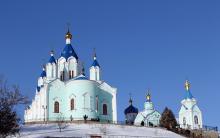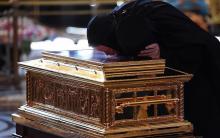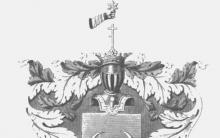Each person is a one and only world, with his own actions, character, habits, honor, morality, self-esteem.
It is precisely the problem of honor and self-esteem that Ostrovsky raises in his play “The Thunderstorm”.
In order to show the contradictions between rudeness and honor, between ignorance and dignity, the play shows two generations: people of the older generation, the so-called “dark kingdom,” and people of a new trend, more progressive, who do not want to live by old laws and customs.
Dikoy and Kabanova are typical representatives of the “dark kingdom”. It was in these images that Ostrovsky wanted to show the ruling class in Russia at that time.
So who are Dikoy and Kabanova?
First of all, these are the richest people in the city, in their hands is the “supreme” power, with the help of which they oppress not only their serfs, but also their relatives. Kuligin said well about the life of the philistines: “... And whoever has money, sir, tries to enslave the poor so that from his free labors he can make even more money...”, and again: “In the philistinism, sir, you are nothing but you won’t see rudeness...” So they live, knowing nothing but money, ruthless exploitation, immense profit at the expense of others.
The images of Dikiy and Kabanova are very similar: they are rude, ignorant people. They are only engaged in tyranny. The wild one is irritated by his relatives who accidentally caught his eye (in particular, Boris): “... I told you once, I told you twice: “Don’t you dare come across me”; you're itching for everything! Not enough space for you? Wherever you go, there you are!..” And if someone comes to ask Dikiy for money, then there will be no way around it without swearing: “I understand that; What are you going to tell me to do with myself when my heart is like this! After all, I already know what I have to give, but I can’t do everything with goodness. You are my friend, and I must give it to you, but if you come and ask me, I will scold you. I will give, give, and curse. Therefore, as soon as you mention money to me, everything inside me will be ignited; It kindles everything inside, and that’s all...”
Kabanova doesn’t like it when Katerina defends her human dignity and tries to protect her husband from unnecessary abuse. Kabanikha is disgusted that someone dares to contradict her, to do something not at her command. But there is a slight difference between Dikiy and Kabanova in relation to their relatives and the people around them. Dikoy swears openly, “as if he’s broken free from a chain,” Kabanikha, “under the guise of piety”: “I know, I know that you don’t like my words, but what can I do, I’m not a stranger to you, my heart is about you it hurts... After all, out of love your parents are strict with you, out of love they scold you, everyone thinks to teach you good. Well, I don’t like it now. And the children will go around praising people that their mother is a grumbler, that their mother does not allow them to pass, that they are squeezing them out of the world. But God forbid, you won’t please your daughter-in-law with some word, so the conversation started that the mother-in-law was completely fed up.”
Greed, rudeness, ignorance, tyranny will always be in them. These qualities were not eradicated because they were raised that way, they grew up in the same environment. People like Kabanova and Dikoy will always be together, it is impossible to separate them. Where one ignorant and tyrant appeared, another will appear. Whatever the society, there will always be people who, under the guise of progressive ideas and education, hide, or rather, try to hide their stupidity, rudeness and ignorance. They tyrannize those around them, without being at all embarrassed and without fear of bearing any responsibility for it. Dikoy and Kabanova are that very “dark kingdom”, relics, supporters of the foundations of this “dark kingdom”. That's who they are, these Wild and Kabanovs, stupid, ignorant, hypocritical, rude. They preach the same peace and order. This is a world of money, anger, envy and hostility. They hate everything new and progressive.
A. N. Ostrovsky’s idea was to expose the “dark kingdom” using the images of Dikiy and Kabanova. He denounced all rich people for lack of spirituality and meanness. Basically, in the secular society of Russia in the 19th century there were such Wild and Kabanovs, as the author showed us in his drama “The Thunderstorm”.
Type: Problem-thematic analysis of the work
A.N. Ostrovsky finished his play in 1859, on the eve of the abolition of serfdom. Russia was awaiting reform, and the play became the first stage in the awareness of impending changes in society.
In his work, Ostrovsky presents us with a merchant milieu that personifies the “dark kingdom.” The author shows a whole gallery of negative images using the example of residents of the city of Kalinov. Using the example of the townspeople, we are shown their ignorance, lack of education, and adherence to the old order. We can say that all Kalinovites are in the shackles of the ancient “house-building”.
Prominent representatives of the “dark kingdom” in the play are the “fathers” of the city in the person of Kabanikha and Dikoy. Marfa Kabanova tortures those around her and those close to her with reproaches and suspicion. She relies on the authority of antiquity in everything and expects the same from those around her. There is no need to talk about her love for her son and daughter; Kabanikha’s children are completely subordinate to her power. Everything in Kabanova's house is based on fear. To frighten and humiliate is her philosophy.
Wild is much more primitive than Kabanova. This is the image of a real tyrant. With his screams and swearing, this hero humiliates other people, thereby, as it were, rising above them. It seems to me that this is a way of self-expression for Dikiy: “What are you going to tell me to do with myself when my heart is like this!”; “I scolded him, I scolded him so much that I couldn’t ask for anything better, I almost killed him. This is the kind of heart I have!”
The unreasonable abuse of the Wild One, the hypocritical pickiness of Kabanikha - all this is due to the powerlessness of the heroes. The more real the changes in society and people, the stronger their voices of protest begin to sound. But the rage of these heroes makes no sense: their words remain only an empty sound. “...But everything is somehow restless, it’s not good for them. Besides them, without asking them, another life has grown with other beginnings, and although it is far away and not yet clearly visible, it is already giving itself a presentiment and sending bad visions to dark tyranny,” writes Dobrolyubov about the play.
The images of Kuligin and Katerina are contrasted with the wild one, Kabanikha, and the whole city. In his monologues, Kuligin tries to reason with the residents of Kalinov, to open their eyes to what is happening around them. For example, all the townspeople are in wild, natural horror from the thunderstorm and perceive it as heavenly punishment. Only Kuligin is not afraid, but sees in a thunderstorm a natural phenomenon of nature, beautiful and majestic. He proposes to build a lightning rod, but does not find approval or understanding from others. Despite all this, the “dark kingdom” failed to absorb this self-taught eccentric. In the midst of savagery and tyranny, he retained the humanity within himself.
But not all the heroes of the play can resist the cruel morals of the “dark kingdom”. Tikhon Kabanov is downtrodden and persecuted by this society. Therefore, his image is tragic. The hero could not resist; from childhood he agreed with his mother in everything and never contradicted her. And only at the end of the play, in front of the body of the dead Katerina, Tikhon decides to confront his mother and even blames her for the death of his wife.
Tikhon's sister, Varvara, finds her own way to survive in Kalinov. A strong, brave and cunning character allows the girl to adapt to life in the “dark kingdom.” For her peace of mind and to avoid troubles, she lives according to the principle of “closet and security”, she deceives and deceives. But by doing all this, Varvara is only trying to live as she wants.
Katerina Kabanova is a bright soul. Against the background of the entire dead kingdom, it stands out for its purity and spontaneity. This heroine is not mired in material interests and outdated everyday truths, like other residents of Kalinov. Her soul strives to free itself from the oppression and suffocation of these people who are strangers to it. Having fallen in love with Boris and cheating on her husband, Katerina is in terrible pangs of conscience. And she perceives the thunderstorm as heavenly punishment for her sins: “Everyone should be afraid! It’s not so scary that it will kill you, but that death will suddenly find you as you are, with all your sins...” Pious Katerina, unable to withstand the pressure of her own conscience, decides to commit the most terrible sin - suicide.
Dikiy’s nephew, Boris, is also a victim of the “dark kingdom.” He resigned himself to spiritual slavery and broke under the yoke of pressure from the old ways. Boris seduced Katerina, but he did not have the strength to save her, to take her away from the hated city. “The Dark Kingdom” turned out to be stronger than this hero.
Another representative of the “Dark Kingdom” is the wanderer Feklusha. She is highly respected in Kabanikha's house. Her ignorant fables about distant countries listen attentively and even believe them. Only in such a dark and ignorant society can no one doubt Feklusha’s stories. The Wanderer supports Kabanikha, feeling her strength and power in the city.
In my opinion, the play “The Thunderstorm” is a work of genius. It reveals so many images, so many characters that it would be enough for a whole encyclopedia of negative characters. All ignorance, superstition, and lack of education were absorbed into Kalinov’s “dark kingdom.” “The Thunderstorm” shows us that the old way of life has long since become obsolete and does not meet modern living conditions. Change is already on the threshold of the “dark kingdom” and, together with the thunderstorm, is trying to break into it. It doesn't matter that they encounter enormous resistance from wild and boar animals. After reading the play, it becomes clear that they are all powerless in the face of the future.
Ostrovsky's play "The Thunderstorm" caused a strong reaction in the field of literary scholars and critics. A. Grigoriev, D. Pisarev, F. Dostoevsky dedicated their articles to this work. N. Dobrolyubov, some time after the publication of “The Thunderstorm,” wrote an article “A Ray of Light in the Dark Kingdom.” Being a good critic, Dobrolyubov emphasized the author's good style, praising Ostrovsky for his deep knowledge of the Russian soul, and reproached other critics for the lack of a direct view of the work. In general, Dobrolyubov’s view is interesting from several points of view. For example, the critic believed that dramas should show the harmful influence of passion on a person’s life, which is why he calls Katerina a criminal. But Nikolai Alexandrovich nevertheless says that Katerina is also a martyr, because her suffering evokes a response in the soul of the viewer or reader. Dobrolyubov gives very accurate characteristics. It was he who called the merchants the “dark kingdom” in the play “The Thunderstorm”.
If we trace how the merchant class and adjacent social strata were displayed over the decades, a complete picture of degradation and decline emerges. In “The Minor” the Prostakovs are shown as limited people, in “Woe from Wit” the Famusovs are frozen statues who refuse to live honestly. All these images are the predecessors of Kabanikha and Dikiy. It is these two characters that support the “dark kingdom” in the drama “The Thunderstorm”.
The author introduces us to the morals and customs of the city from the very first lines of the play: “Cruel morals, sir, in our city, cruel!” In one of the dialogues between residents, the topic of violence is raised: “Whoever has money, sir, tries to enslave the poor... And among themselves, sir, how they live!... They quarrel with each other.” No matter how much people hide what is happening inside families, others already know everything. Kuligin says that no one has prayed to God here for a long time. All the doors are locked, “so that people don’t see how... they eat their family and tyrannize their family.” Behind the locks there is debauchery and drunkenness. Kabanov goes to drink with Dikoy, Dikoy appears drunk in almost all scenes, Kabanikha is also not averse to having a glass - another in the company of Savl Prokofievich.
The entire world in which the inhabitants of the fictional city of Kalinov live is thoroughly saturated with lies and fraud. Power over the “dark kingdom” belongs to tyrants and deceivers. The residents are so accustomed to dispassionately fawning over wealthier people that this lifestyle is the norm for them. People often come to Dikiy to ask for money, knowing that he will humiliate them and not give them the required amount. The merchant's most negative emotions are caused by his own nephew. Not even because Boris flatters Dikoy in order to get money, but because Dikoy himself does not want to part with the inheritance he received. His main traits are rudeness and greed. Dikoy believes that since he has a large amount of money, it means that others should obey him, fear him and at the same time respect him.
Kabanikha advocates for the preservation of the patriarchal system. She is a real tyrant, capable of driving anyone she doesn't like crazy. Marfa Ignatievna, hiding behind the fact that she reveres the old order, essentially destroys the family. Her son, Tikhon, is glad to go as far as possible, just not to hear his mother’s orders, her daughter does not value Kabanikha’s opinion, lies to her, and at the end of the play she simply runs away with Kudryash. Katerina suffered the most. The mother-in-law openly hated her daughter-in-law, controlled her every action, and was dissatisfied with every little thing. The most revealing scene seems to be the farewell scene to Tikhon. Kabanikha was offended by the fact that Katya hugged her husband goodbye. After all, she is a woman, which means she should always be inferior to a man. A wife’s destiny is to throw herself at her husband’s feet and sob, begging for a quick return. Katya does not like this point of view, but she is forced to submit to the will of her mother-in-law.
Dobrolyubov calls Katya “a ray of light in a dark kingdom,” which is also very symbolic. Firstly, Katya is different from the residents of the city. Although she was brought up according to the old laws, the preservation of which Kabanikha often talks about, she has a different idea of life. Katya is kind and pure. She wants to help the poor, she wants to go to church, do household chores, raise children. But in such a situation, all this seems impossible because of one simple fact: in the “dark kingdom” in “The Thunderstorm” it is impossible to find inner peace. People constantly walk in fear, drink, lie, cheat on each other, trying to hide the unsightly sides of life. In such an atmosphere it is impossible to be honest with others, honest with oneself. Secondly, one ray is not enough to illuminate the “kingdom”. Light, according to the laws of physics, must be reflected from some surface. It is also known that black has the ability to absorb other colors. Similar laws apply to the situation with the main character of the play. Katerina does not see in others what is in her. Neither the city residents nor Boris, a “decently educated man,” could understand the reason for Katya’s internal conflict. After all, even Boris is afraid of public opinion, he is dependent on Diky and the possibility of receiving an inheritance. He is also bound by a chain of deception and lies, because Boris supports Varvara’s idea of deceiving Tikhon in order to maintain a secret relationship with Katya. Let's apply the second law here. In Ostrovsky’s “The Thunderstorm,” the “dark kingdom” is so all-consuming that it is impossible to find a way out of it. It eats Katerina, forcing her to take on one of the most terrible sins from the point of view of Christianity - suicide. "The Dark Kingdom" leaves no other choice. It would find her anywhere, even if Katya ran away with Boris, even if she left her husband. No wonder Ostrovsky transfers the action to a fictional city. The author wanted to show the typicality of the situation: such a situation was typical of all Russian cities. But is it only Russia?
Are the findings really that disappointing? The power of the tyrants is gradually beginning to weaken. Kabanikha and Dikoy feel this. They feel that soon other people, new ones, will take their place. People like Katya. Honest and open. And, perhaps, it is in them that those old customs that Marfa Ignatievna zealously defended will be revived. Dobrolyubov wrote that the ending of the play should be viewed in a positive way. “We are glad to see Katerina’s deliverance - even through death, if it is impossible otherwise. Living in the “dark kingdom” is worse than death.” This is confirmed by the words of Tikhon, who for the first time openly opposes not only his mother, but also the entire order of the city. “The play ends with this exclamation, and it seems to us that nothing could have been invented stronger and more truthful than such an ending. Tikhon’s words make the viewer think not about a love affair, but about this whole life, where the living envy the dead.”
The definition of the “dark kingdom” and the description of the images of its representatives will be useful to 10th grade students when writing an essay on the topic “The Dark Kingdom in the play “The Thunderstorm” by Ostrovsky.”
Work test
Dark Kingdom
The most important feature of Ostrovsky's theater to this day remains the topicality of the plays. Ostrovsky’s works are still successfully performed on theater stages today, because the characters and images created by the artist have not lost their freshness. To this day, viewers reflect on who is right in the dispute between patriarchal ideas about marriage and freedom of expression of feelings, immerse themselves in an atmosphere of dark ignorance, rudeness and are amazed at the purity and sincerity of Katerina’s love.
The city of Kalinov, in which the action of the drama “The Thunderstorm” unfolds, is an artistic space within which the writer sought to extremely generalize the vices characteristic of the merchant environment of the mid-19th century. It’s not for nothing that the critic Dobrolyubov calls Kalinov a “dark kingdom.” This definition exactly describes the atmosphere described in the city.
Ostrovsky depicts Kalinov as a closed space: the gates are locked, no one cares about what happens behind the fence. In the exposition of the play, the audience is presented with a Volga landscape, evoking poetic lines in Kuligin’s memory.
But the description of the vastness of the Volga only strengthens the feeling of the closedness of the city, in which no one even walks along the boulevard. The city lives its own boring and monotonous life. The poorly educated residents of Kalinov learn news about the world not from newspapers, but from wanderers, for example, such as Feklusha. The favorite guest in the Kabanov family talks about how “there is still a land where all the people have dog heads,” and in Moscow there are only “promenades and games, and there is a roar and a groan along the Indian streets.” The ignorant inhabitants of the city of Kalinov willingly believe in such stories, which is why Kalinov appears to the townspeople as a paradise. Thus, separated from the whole world, like a distant state, in which residents see almost the only promised land, Kalinov himself begins to acquire fairy-tale features, becoming a symbolic image of a sleepy kingdom. The spiritual life of the inhabitants of Kalinov is limited by the rules of Domostroy, the observance of which is required by each generation of parents from each generation of children; tyranny reigns all around and money rules.
The main guardians of the age-old order in the city are Marfa Ignatievna Kabanova and Savel Prokofievich Dikoy, whose moral standards are distorted. A striking example of tyranny is the episode in which Ostrovsky ironically portrays Dikiy, speaking about his “kindness”: having scolded a man who asked him for a salary, Savel Prokofievich repents of his behavior and even asks for forgiveness from the worker. Thus, the writer depicts the absurdity of the Wild’s rage, replaced by self-flagellation. Being a wealthy merchant and having a lot of money, Dikoy considers people below him to be “worms” whom he can pardon or crush at will; the hero feels impunity for his actions. Even the mayor is unable to influence him. Dikoy, feeling himself not only the master of the city, but also the master of life, is not afraid of the official. The family is also afraid of a wealthy merchant. Every morning his wife tearfully begs those around her: “Fathers, don’t make me angry!” But Savel Prokofievich quarrels only with those who cannot fight back. As soon as he encounters resistance, his mood and tone of communication change dramatically. He is afraid of his clerk Kudryash, who knows how to resist him. Dikoy does not quarrel with the merchant's wife Marfa Ignatievna, the only one who understands him. Only Kabanikha is able to pacify the violent temper of Savel Prokofievich. She alone sees that Dikoy himself is not happy with his tyranny, but she can’t help herself, so Kabanikha considers herself stronger than him.
And indeed, Marfa Ignatievna is not inferior to Dikiy in despotism and tyranny. Being a hypocrite, she tyrannizes her family. Kabanikha is depicted by Ostrovsky as a heroine who considers herself the keeper of the foundations of Domostroy. The patriarchal value system, of which only the outward appearance remains, is most important to her. Ostrovsky demonstrates Marfa Ignatievna’s desire to follow previous traditions in everything in the scene of Tikhon’s farewell to Katerina. A conflict arises between Katerina and Kabanikha, reflecting the internal contradictions between the heroines. Kabanikha blames Katerina for not “howling” or “lying on the porch” after her husband’s departure, to which Katerina remarks that to behave this way is “to make people laugh.”
The boar, doing everything “under the guise of piety,” demands complete obedience from her household. In the Kabanov family, everyone must live as Marfa Ignatievna demands. Kuligin absolutely accurately characterizes Kabanikha in his dialogue with Boris: “Prude, sir! He gives money to the poor, but completely eats up his family!” The main objects of her tyranny are her own children. The power-hungry Kabanikha does not notice that under her yoke she has raised a pathetic, cowardly man who has no opinion of her own - her son Tikhon and her cunning daughter Varvara, who gives the impression of being decent and obedient. In the end, unjustified cruelty and the desire to control everything lead Kabanikha to tragedy: his own son blames his mother for the death of his wife Katerina (“Mama, you ruined her”), and her beloved daughter, who does not agree to live within the tyranny, runs away from home.
Assessing the images of the “dark kingdom,” one cannot but agree with Ostrovsky that cruel tyranny and despotism are real evil, under the yoke of which human feelings fade, wither, the will weakens, and the mind fades. “The Thunderstorm” is an open protest against the “dark kingdom”, a challenge to ignorance and rudeness, hypocrisy and cruelty.
It has gone to the extreme, to the denial of all common sense; It is more than ever hostile to the natural demands of humanity and is trying more fiercely than ever to stop their development, because in their triumph it sees the approach of its inevitable destruction.
N. A. Dobrolyubov
Alexander Nikolaevich Ostrovsky, for the first time in Russian literature, deeply and realistically depicted the world of the “dark kingdom”, painted colorful images of tyrants, their life and customs. He dared to look behind the iron merchant gates and was not afraid to openly show the conservative power of “inertia”, “numbness”. Analyzing Ostrovsky’s “plays of life”, Dobrolyubov wrote: “Nothing holy, nothing pure, nothing right in this dark world: the tyranny dominating him, wild, insane, wrong, drove out of him all consciousness of honor and right... And they cannot be there , where human dignity, personal freedom, faith in love and happiness and the sanctity of honest labor have been crushed into dust and brazenly trampled by tyrants.” And yet, many of Ostrovsky’s plays depict “the precariousness and the near end of tyranny.”
The dramatic conflict in “The Thunderstorm” lies in the clash of the obsolete morality of tyrants with the new morality of people in whose souls a sense of human dignity is awakening. In the play, the background of life itself, the setting itself, is important. The world of the “dark kingdom” is based on fear and monetary calculation. Self-taught watchmaker Kuligin tells Boris: “Cruel morals, sir, in our city, cruel! He who has money tries to enslave the poor so that he can make even more money from his free labors.” Direct financial dependence forces Boris to be respectful with the “scold” Dikiy. Tikhon is obediently obedient to his mother, although at the end of the play even he rises to a kind of rebellion. Wild Curly's clerk and Tikhon's sister Varvara are cunning and dodgy. Katerina’s discerning heart senses the falseness and inhumanity of the life around her. “Yes, everything here seems to be out of captivity,” she thinks.
The images of tyrants in “The Thunderstorm” are artistically authentic, complex, and lack psychological certainty. Dikoy is a rich merchant, a significant person in the city of Kalinov. At first glance, nothing threatens his power. Savel Prokofievich, according to Kudryash’s apt definition, “feels like he’s broken free from a chain”: he feels like the master of life, the arbiter of the destinies of the people under his control. Isn’t this what Dikiy’s attitude towards Boris speaks about? Those around him are afraid to anger Savel Prokofievich with something, his wife is in awe of him.
Dikoy feels the power of money and the support of state power on his side. The requests to restore justice made by the “peasants” deceived by the merchant to the mayor turn out to be futile. Savel Prokofievich patted the mayor on the shoulder and said: “Is it worth it, your honor, for us to talk about such trifles!”
At the same time, as already mentioned, the image of the Wild is quite complex. The harsh disposition of a “significant person in the city” encounters not some kind of external protest, not the manifestation of discontent of others, but internal self-condemnation. Savel Prokofievich himself is not happy with his “heart”: “I was fasting about fasting, about great things, but now it’s not easy and slip a little man in; I came for money, carried firewood... I did sin: I scolded him, I scolded him so much that I couldn’t ask for anything better, I almost beat him to death. This is the kind of heart I have! After asking for forgiveness, he bowed at his feet. This is what my heart brings me to: here in the yard, in the dirt, I bowed; I bowed to him in front of everyone.” This recognition of the Wild contains a terrible meaning for the foundations of the “dark kingdom”: tyranny is so unnatural and inhuman that it becomes obsolete and loses any moral justification for its existence.
The rich merchant Kabanova can also be called a “tyrant in a skirt.” Kuligin put into his mouth an exact description of Marfa Ignatievna: “Prude, sir! He gives money to the poor, but completely eats up his family.” In a conversation with her son and daughter-in-law, Kabanikha hypocritically sighs: “Oh, a grave sin! How long will it take to sin!”
Behind this feigned exclamation lies a domineering, despotic character. Marfa Ignatievna actively defends the foundations of the “dark kingdom” and tries to conquer Tikhon and Katerina. Relations between people in the family should, according to Kabanova, be regulated by the law of fear, the Domostroevsky principle “let the wife fear her husband.” Marfa Ignatievna’s desire to follow previous traditions in everything is manifested in the scene of Tikhon’s farewell to Katerina.
The position of the mistress of the house cannot completely calm down Kabanikha. Marfa Ignatievna is frightened by the fact that young people want freedom, that the traditions of hoary antiquity are not respected. “What will happen, how the old people will die, how the light will remain, I don’t know. Well, at least it’s good that I won’t see anything,” Kabanikha sighs. In this case, her fear is completely sincere, and is not intended for any external effect (Marfa Ignatievna pronounces her words alone).
The image of the wanderer Feklusha plays a significant role in Ostrovsky’s play. At first glance, we have a minor character. In fact, Feklusha is not directly involved in the action, but she is a myth-maker and defender of the “dark kingdom”. Let’s listen to the wanderer’s reasoning about “Persian sultan makhnute” and “Turkish sultan makhnute”: “And they cannot... judge a single case righteously, such is the limit set for them. Our law is righteous, but theirs is...unrighteous; that according to our law it turns out this way, but according to them everything is the opposite. And all their judges, in their countries, are also all unrighteous...” The main meaning of the above words is that “we have a righteous law.:”.
Feklusha, anticipating the death of the “dark kingdom,” shares with Kabanikha: “The last times, Mother Marfa Ignatievna, by all accounts, the last.” The wanderer sees an ominous sign of the end in the acceleration of the passage of time: “Time has already begun to diminish... smart people notice that our time is becoming shorter.” And indeed, time works against the “dark kingdom”.
Ostrovsky comes to large-scale artistic generalizations in the play and creates almost symbolic images (thunderstorm). The remark at the beginning of the fourth act of the play is noteworthy: “In the foreground is a narrow gallery with the arches of an ancient building that is beginning to collapse...” It is in this decaying, dilapidated world that Katerina’s sacrificial confession sounds from its very depths. The fate of the heroine is so tragic primarily because she rebelled against her own Domostroevsky ideas about good and evil. The ending of the play tells us that living “in the dark kingdom is worse than death” (Dobrolyubov). “This end seems joyful to us...” we read in the article “A Ray of Light in a Dark Kingdom”, “... it gives a terrible challenge to the tyrant power, it tells it that it is no longer possible to go further, it is impossible to live any longer with its violent, deadening principles.” The irresistibility of the awakening of man in man, the rehabilitation of living human feeling that replaces false asceticism, constitute, it seems to me, the enduring merit of Ostrovsky’s play. And today it helps to overcome the power of inertia, numbness, and social stagnation.
Essay on literature on the topic: “The Dark Kingdom” in Ostrovsky’s play “The Thunderstorm”
Other writings:
- A. N. Ostrovsky finished his play in 1859, on the eve of the abolition of serfdom. Russia was awaiting reform, and the play became the first stage in the awareness of impending changes in society. In his work, Ostrovsky presents us with a merchant milieu that personifies the “dark kingdom.” Read More......
- It is known that extremes are reflected by extremes, and that the strongest protest is not the one that finally rises from the mud of the weakest and most patient. N. A. Dobrolyubov Ostrovsky’s plays were not invented. These works were born from life itself, and the author only cited Read More......
- “The Thunderstorm” was published in 1859 (on the eve of the revolutionary situation in Russia, in the “pre-storm” era). Its historicism lies in the conflict itself, the irreconcilable contradictions reflected in the play. It responds to the spirit of the times. “The Thunderstorm” represents the idyll of the “dark kingdom”. Tyranny and silence are brought to Read More ......
- The name of Alexander Nikolaevich Ostrovsky is one of the most famous in the history of Russian literature and Russian theater. In 1812, the great Russian writer A.I. Goncharov, greeting Ostrovsky on the day of the thirty-fifth anniversary of his literary activity, said: “You have done everything that befits a great Read More ......
- “The Thunderstorm” is a most amazing work of Russian, powerful, completely self-mastered talent. I, S. Turgenev Autumn 1859. Premiere at the Moscow Maly Theater. Great actors play a play by a great playwright. Treatises will be written about this work, N. Dobrolyubov will come together in polemics about it Read More ......
- A. N. Ostrovsky’s play “The Thunderstorm” was written in 1859. At this time, Russian society was wondering about the further path of development of Russia. Slavophiles and Westerners argued fiercely about what was better: patriarchy (autocracy, nationality, Orthodoxy) or orientation to Western values Read More ......
- Each person is a one and only world, with his own actions, character, habits, honor, morality, self-esteem. It is precisely the problem of honor and self-esteem that Ostrovsky raises in his play “The Thunderstorm”. In order to show the contradictions between rudeness and honor, between Read More......
- The drama “The Thunderstorm” was written by Alexander Nikolaevich Ostrovsky in 1859 after traveling along the Volga. It was believed that a certain Alexandra Klykova served as the prototype of Katerina. Her story is in many ways similar to the heroine’s story, but Ostrovsky finished work on the play a month before his suicide Read More ......











People who have overcome cancer? How to beat cancer? Why humanity will never be able to defeat cancer And thereby defeat cancer
How to find out when I will get pregnant by date of birth
Major Arcana Tarot Tower: the meaning of the upright and inverted card
Removing a lapel from yourself and your loved ones How to remove a lapel from money
Unction - a sacrament that heals soul and body